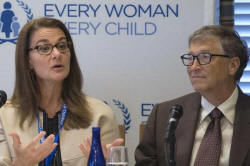|
 How
Wellcome and Gates charities profit from helping biotech How
Wellcome and Gates charities profit from helping biotech
 Send a link to a friend
Send a link to a friend
[May 31, 2016]
By Ben Hirschler
LONDON (Reuters) - The Wellcome Trust
medical charity is to profit from U.S. approval of a new diagnostic
cancer test, the first commercial product funded by the organization
since the sale of its pharmaceuticals business to Glaxo in 1995.
|
|
 The regulatory green light shows how the world's healthcare leading
charities are becoming important sources of finance for biotech
start-ups and can gain when the young firms they back succeed. The regulatory green light shows how the world's healthcare leading
charities are becoming important sources of finance for biotech
start-ups and can gain when the young firms they back succeed.
The Bill & Melinda Gates Foundation recently made a $80 million
profit from selling a stake in Anacor Pharmaceuticals, a firm it had
backed for its work on neglected diseases, which is now being bought
by Pfizer.
With an endowment of $40 billion, the Gates foundation is the
world’s largest charity, while Wellcome has an 18 billion pound ($26
billion) investment portfolio. Their scale makes both organizations
powerful forces in global medicine.
The new cancer test called Axumin, which got a green light from the
U.S. Food and Drug Administration on Friday, was developed by
start-up firm Blue Earth Diagnostics, which is owned by Syncona,
Wellcome's biotech investment arm.

It is injected as part of a PET scan and helps reveal recurrent
prostate cancer.
"It's a validation of our investment approach," said Martin Murphy,
chief executive of Syncona, who said profits would flow back to the
main organization for its charitable work.
Syncona is a major investor in several other companies developing
innovative products that it believes offer substantial patient
benefits, including two firms working on gene therapies for
blindness and liver problems.
With 250 million pounds to invest over the long term, Syncona aims
to achieve returns that can help fund the charity, while also
focusing on unmet medical needs and helping companies that would
otherwise struggle to raise money.
[to top of second column] |

The Gates Foundation approach is somewhat different. Its
"program-related investments" are designed to spur entrepreneurs and
companies to pursue ideas in the public good, rather than
necessarily to make a profit.
But it still stumbled on a big financial win with Anacor, thanks a
soaring share price as the company's drugs made progress, and the
foundation sold 99 percent of its stake for $86.7 million last
November, 17 times its initial 2013 investment of $5 million.
The Wellcome Trust sold the majority of its stake in the Wellcome
drug company to Glaxo in 1995. That led to the creation of Glaxo
Wellcome, which later merged with SmithKline Beecham in 2000 to form
GlaxoSmithKline.
(Editing by Jason Neely)
[© 2016 Thomson Reuters. All rights
reserved.] Copyright 2016 Reuters. All rights reserved. This material may not be published,
broadcast, rewritten or redistributed.
 |